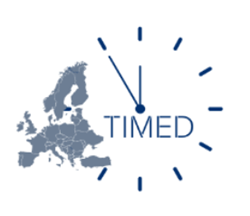TIMED: TIMe experience in Europe’s Digital age
What is TIMED?
 TIMED is a large cross-cultural research study that will investigate for the first time how increasing digital technology use is affecting how we experience time as individuals and in society across Europe.
TIMED is a large cross-cultural research study that will investigate for the first time how increasing digital technology use is affecting how we experience time as individuals and in society across Europe.
Why do we need this project?
During the last two decades, there has been a significant increase in the use of digital technology in our work, social and personal lives. As a result, many people now live in a state of “permanent connectivity” which enables them to be contacted at anytime, anywhere, and to seek information and stimulation with greater ease and immediacy than ever before. As a result, the traditional boundaries between work-time and personal-time can appear evermore blurred and the pace of life can feel increasingly fast. This is in part because the rhythm of daily life is now dictated by digital devices.
Exactly how increasing digital technology use is affecting the availability of time, our use of time and experience of temporality is currently unknown. At an individual level, it is unclear whether digitalisation is enhancing time availability and wellbeing or reducing free time and quality of life. At a societal level, it is unclear whether increased digitalisation is having a unifying or divisive effect on the European sense of time.
What is the aim?
We will establish how and why the perception, use and allocation of time are affected by personal levels of digitalisation and cultural norms, and how this then impacts on quality of life. This will be achieved through a series of studies using interviews, online questionnaires, psychophysiological recording and real-time behaviour analysis. Data will be collected in the Czech Republic, Germany, Poland, Spain, Switzerland, and the UK to enable cross-cultural comparisons within Europe.
Who will conduct the study?
Dr Ruth Ogden from Liverpool John Moores University leads the research project and collaborates with a diverse group of psychologists, sociologists, neuroscientists, computer engineers and STS scholars from six European countries. Apart from the project leader, there are six principal investigators. To date, the research team have published over 350 peer reviewed papers and 4 books on temporal experience:
- Project Leader: Ruth Ogden, Reader in Experimental Psychology, Liverpool John Moores University, School of Psychology, United Kingdom
- Nuria Codina, Associate Professor, University of Barcelona, Social Psychology and Quantitative Psychology, Spain
- Filip Vostal, Research Associate, Institute of Philosophy of the Czech Academy of Sciences, Centre for Science, Technology, and Society Studies, Institute of Philosophy of the Czech Academy of, Czechia
- Chantal Martin-Soelch, Professor in Clinical and Health Psychology, University Fribourg, Psychology, Switzerland
- Marc Wittmann, Research Fellow, Institute for Frontier Areas of Psychology and Mental Health, Germany
- Joanna Witowska, Early-career researcher, University of Warsaw, Faculty of Psychology, Poland; Assistant Professor, The Maria Grzegorzewska University, Poland
- Omar Abou Khaled, Professor of Computer Science, HES-SO / HumanTech Institute HES-SO / HumanTech Institute, Switzerland






In addition to the project leader and principal investigators, a diverse team of other researchers such as PhD students, junior researchers, post-doctoral and senior researchers will contribute to the study. The current team comprises:
- Christine Schoetensack, Research assistant, Liverpool John Moores University, School of Psychology, United Kingdom
- Julie Papastamatelou, Post-doctoral researcher, University of Applied Management Studies, Germany
- Vanda Černohorská, Post-doctoral researcher, Institute of Philosophy, Academy of Sciences of the Czech Republic
- Mónica Fernández Boente, Diploma assistant, University Fribourg, Psychology, Switzerland
- José Vicente Pestana, Associate Professor, University of Barcelona, Social Psychology and Quantitative Psychology, Spain
- Leonardo Angelini, Academic Associate, HES-SO / HumanTech Institute HES-SO / HumanTech Institute, Switzerland
Who funds the study?
 This study is funded by CHANSE and has been allocated a budget of €1,561,444.
This study is funded by CHANSE and has been allocated a budget of €1,561,444.
Sponsors include:






What will the project achieve?
By establishing how digitalisation influences individual and societal temporal experience the project will identify who is experiencing a temporal benefit from digitalisation, and who experiences a temporal cost. This information will have significant implications for the health, wellbeing, and economic activity in the digital age. It will also help to shape a future in which we are better to maximise the benefits of increased digitalisation on temporal experience whilst mitigating against the costs of an ever more connected life.
Cooperation partners
The TIMED project has secured the support and involvement of a broad range of Cooperation partners:
Trade unions
- Allison Roach (UNISON)
- Patrick Roach (NASUWT)
- Anna Mowbray (Community)
- Vit Samek (Czech-Moravian Confederation of Trade Unions)




Media
- Lianne Kerlin (BBC)

Health
- Nadia Ranceva (Alder Hey Children's NHS Foundation Trust)
- Dr Louise Theodosiou (Manchester University NHS Foundation Trust)
- Dominique de Quervain (Stress Network)



Policy making
- Dietrich Henckel (German Society for Time policy)
- Abigail Gilbert (Institute for the Future of Work)


Historical organisations
- Dr James Nye (AHS - The Story of Time)

Contact us
For more information, please contact Dr Ruth Ogden (email: R.S.Ogden@ljmu.ac.uk, telephone: 0151 904 6342)
 Follow the TIMED project Twitter for the latest updates.
Follow the TIMED project Twitter for the latest updates.
